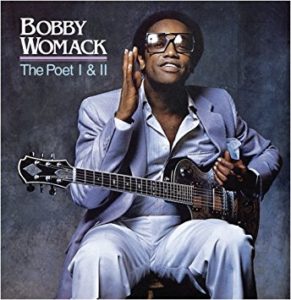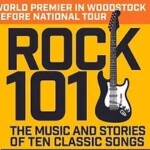By Ira Kantor
By the time he hit age 37, the late, great Bobby Womack had lived a lifetime of accomplishment and tragedy.
From the deaths of his mentor Sam Cooke, his brother Harry (the inspiration for “Harry Hippie”), and young son; to drug addiction; to making professional inroads with legends like Sly Stone, Wilson Pickett and Janis Joplin, Womack had taken the ride to Hell and back, reveling and mourning all the way.
Though scathed as a result, turns out he was just getting warmed up. Womack would release perhaps his greatest album—after 12 prior studio releases—in 1981.
Dubbed The Poet (though The Preacher would have been more appropriate), the album proved Womack’s most energetic both lyrically and musically as he attacked love, relationships and human frailties with a newfound fervor. Beaming brightly on the cover, Bobby unleashed eight tracks of balladry and pure funk, resulting in one of the greatest soul albums most mainstream music fans have likely never heard of. It’s one I’ve blasted through headphones at work, and at high volume in the car, both on frequent repeat.
To try to recapture the energy conveyed on The Poet, I reached out to legendary bassist Nathan East, who not only played prominently on the album, but made his name backing up everyone from Eric Clapton to Phil Collins.
“It had been several years since “Lookin’ for a Love” and those kinds of records. It felt like this was kind of a special comeback effort—certainly that was the way it was presented,” East told me recently. “It’s always a great feeling when you go into a studio and are working on something like an iconic project like this. Everybody has a certain respect and reverence towards the artist. Being kind of a newcomer, it was very soulful. Given the gathering of musicians you could tell you were doing something great and doing something big. There was an atmosphere in the air.”
Don’t let the album’s opening lyric fool you (“I’ve up to my heart in teardrops, out of my mind over you”); Womack is feeling good all ever. Even when he’s woeful, he’s jubilant and powerfully emotional. Unlike more subdued tracks of yore like “That’s the Way I Feel About Cha,” Bobby wails and screams from the heart, producing an effort that’s one-half soul (the human kind) and the other uptown funk (before the term slapped public consciousness thanks to Mark Ronson and Bruno Mars).
“I was definitely a fan of [Bobby’s] work. Anybody in our community was a fan. He was part of the neighborhood, similar to Motown and those kinds of artists that just permeate the sounds you heard growing up,” East recalled. “You’re in the studio with one of the world’s greatest vocalists. For me, it was an exciting time in my career getting in and getting started.”
“[Bobby] was a very nice man, very soft spoken and—like his music—just high quality. It was very professional,” East adds. “He was definitely complimentary on a one-on-one level. When things went well, he had a big smile on his face. It was a great vibe.”
To me, The Poet is one of those albums where every song is terrific: think James Brown with just a whiff of humility. In sequence, here are the best elements of each track:
“So Many Sides of You:” Along with the previously mentioned opening lyric, you got to love the interplay between Bobby and his background vocalists (including several members of the Womack clan). It’s like a joyous Valentinos reunion!
“Lay Your Lovin’ On Me:” The groove, period.
“Secrets:” Driven by an infectious slap bass, this is the funkiest song ever recorded that unabashedly references Kentucky Fried Chicken.
“Just My Imagination:” Bobby does what Bobby does best: lament about love and make it sound like it’s a bad trip still worth taking.
“Stand Up:” Without this track, “You Dropped a Bomb On Me” by The Gap Band would probably never have existed.
“Games:” Bobby’s in full preacher mode here and the results are heavenly.
“If You Think You’re Lonely Now:” Bobby’s big comeback hit, this track has Philly Soul written all over it even though it’s anything but. With background vocalists hitting crescendos and Bobby alternating between spoken word, gospel and 100 percent soul, there isn’t a better playbook for R&B perfection out there. When asked what went through his mind during the recording of this song, East told me: “I was just thinking to myself, ‘What a strong hook, with pretty great lyrics too!’”
“Where Do We Go From Here:” You’ll do a double take when you hear Womack sing “Let’s go to Mars where children play and live on candy bars” but remember the term “poet” here is loose as it applies to him. Bobby doesn’t have to be Wordsworth, nor does he have to be a supreme wordsmith. He chooses his words intentionally from the heart. The result is a one of music’s greatest KO punches.
The success of The Poet prompted a sequel three years later entitled—what else?—The Poet II. This time around Womack would share vocal duties for a third of the album with soulful songbird Patti Labelle. Though it adheres to the “if it ain’t broke, don’t fix it” mentality, I find the second Poet just doesn’t have the same power as the first (even though I do enjoy the over-the-top “Trying to Get Over You” and “Tell Me Why”).
For me, the first Poet is the icing on the cake for Bobby’s 2009 induction into the Rock and Roll Hall of Fame and why the name Womack equates with music legend, even three years after his death.
Adds East: “(Bobby) has contributed so much to the world of music. I would put him in the same legendary status as any artist that pours their heart and soul into their craft and profession.”








Be the first to comment!